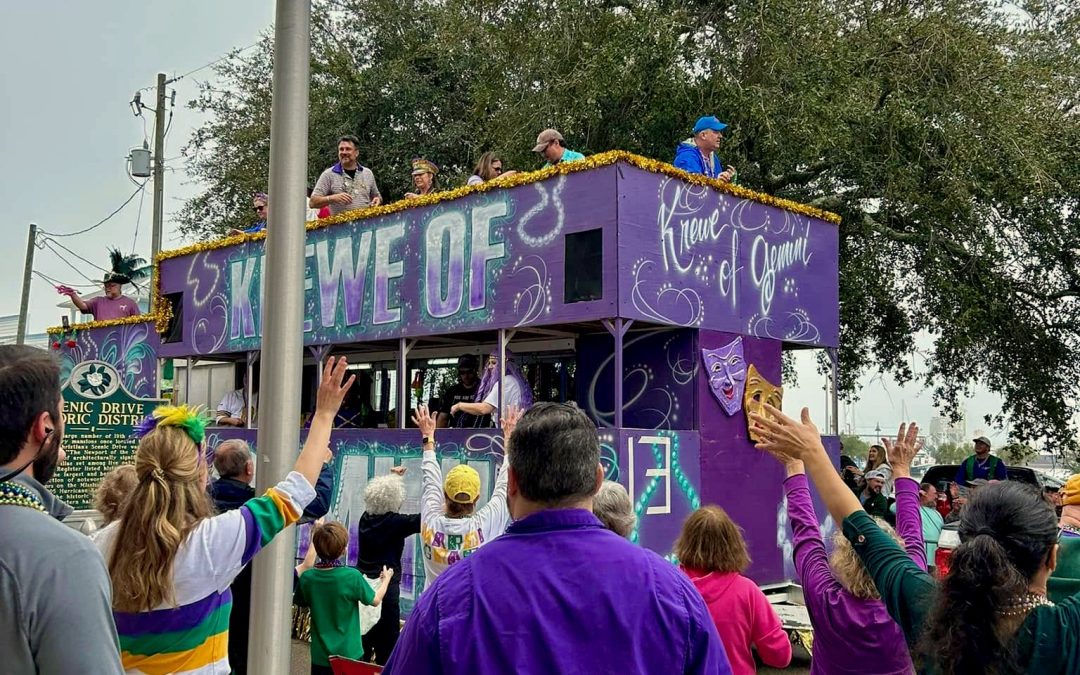The feud over who does Carnival better has been a rivalry for the ages between Mobile, the city that celebrated Mardi Gras in the U.S. first, and New Orleans, the city that touts having perfected the extravaganza. At the center sits Mississippi, like an inconspicuous middle child with a knowing glint in its eye, who says, “Hold my beer, y’all.”
Mississippi’s first recorded Mardi Gras parade took place in 1908 in Biloxi, organized by the Elks Lodge, city officials, and prominent figures like Walter Henry ‘Skeet’ Hunt. This inaugural Carnival event featured traditional elements such as the Boeuf Gras (fatted calf) and decorative floats. However, records indicate that masquerade balls were held in coastal hotels as early as the mid-1800s, with costumed citizens celebrating in the streets before establishing organized parades and krewes. In Mississippi, these traditions were introduced by the French—a culture renowned for its exceptional cuisine, striking fashion, and grand celebrations. These French influences have left a lasting mark on the traditions of the seasonal balls, krewe parties, and elaborate costuming seen today. “In truth,” adds Abreeza Thomas, executive director of the Coastal Mississippi Mardi Gras Museum. “I think Mississippi’s culture is and has always been influenced, even shaped, by Mardi Gras, not the other way around, and if there’s one thing Mississippi loves, it’s tradition. Carnival is a beloved one.”
Perhaps there is something to Thomas’s summation: community, craftsmanship, rich food, and deeply expressive music are at the heart of the Mississippian way of life—fundamentals of generational traditions. Mississippi’s approach to Carnival is notably family-friendly, appealing to those who prefer to avoid the gridlocked traffic often seen in larger cities. Many of Mississippi’s oldest krewes, such as Les Masquees and the Gulf Coast Carnival Association, are rooted in family and often passed down. Throughout the state, imagery, costuming, and themes tend to reflect a more wholesome take, offering an accessible experience compared to the larger crowds and scale of parades in neighboring New Orleans. “Having the option to observe Carnival without the hustle and bustle of a busy, tourist-filled city like New Orleans is very appealing and certainly more accessible for many people,” explains Thomas. “I suppose you could think about it like gumbo. Which ingredients you add, the color of the roux, what base makes your roux, and whether or not to add okra depends on where you live—maybe even your family recipe—but the main principles and flavors of the dish remain the same.”
Thus, it’s really the spirit of the season that motivates Mississippi revelers. “We love that ephemeral Mardi Gras magic, so to speak. Historically, the celebration has roots in springtime, reawakening after a long winter, and it’s become part of our natural rhythm now,” shares Thomas. On the Gulf Coast, Carnival, which means farewell to flesh, leads to a time of togetherness and celebration, drawing friends and family to enjoy the outdoors, good company, and the unique coastal atmosphere. “Where else in Mississippi can you watch a fantastic parade, walk along the beach with something refreshing in hand, and then dine on tasty local seafood?”
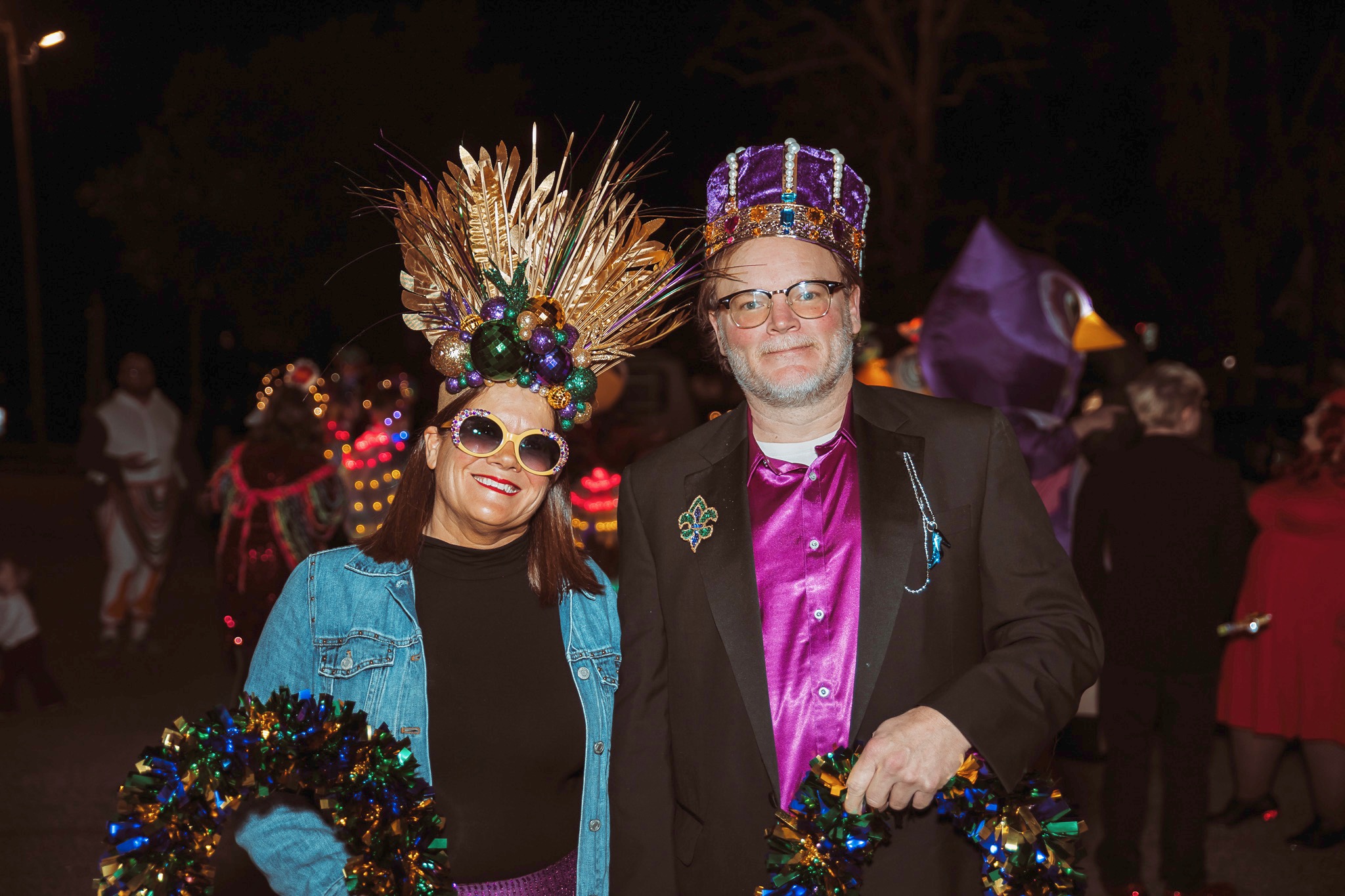
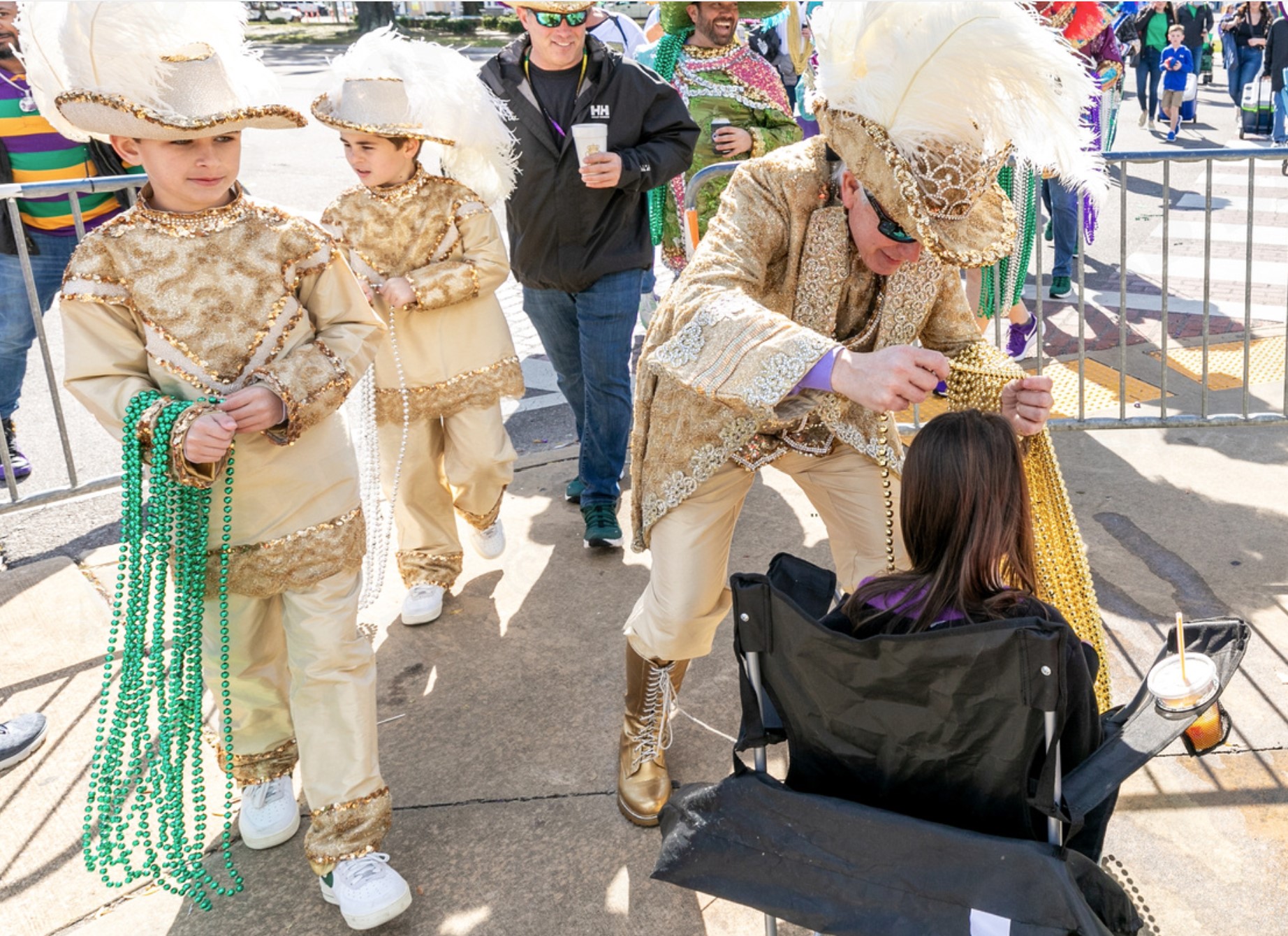
Like New Orleans, Mardi Gras balls are central to Mississippi’s coastal Carnival culture. Each krewe upholds unique traditions for attire and tableaus, a ceremonial presentation where the court is introduced to the guests and performers highlight the krewe’s theme through elaborate costumes, decorations, and choreography—a pivotal moment showcasing the krewe’s creativity and setting the tone for the celebration. Other krewes, like the Biloxi Second Liners, skip parades altogether to focus on community support. Since that first parade in 1908, Carnival has grown significantly on the Gulf Coast. Today, larger parades showcase more than 20 floats, with marching bands, sponsors, walking krewes like the Old Biloxi Marching Club, dance groups, and more. While Biloxi began with one primary krewe (now the Gulf Coast Carnival Association), the coast is now home to 45 to 50 krewes spanning the region, and its influence has spread throughout the state.
In Hattiesburg, the Krewe of St. Catherine encourages its sub-krewes to get creative, interact with the crowd, and even make custom throws. This unique parade only allows “human-powered” floats—no trucks or even golf carts. “We’ve had bikes and carts and are hoping to see more contraptions from our sub-krewes, who have gotten very creative,” says Ginger Lowrey, captain of the Krewe of St. Catherine, which was inspired by its founders’ experience with parade groups like the Hattiesburg Hot Steppers. Realizing a need for a more pedestrian-friendly parade, St. Catherine was chosen as the krewe’s patroness due to her symbolism—most notably the wheel- aligning with Hattiesburg’s “Hub City” theme. Additionally, her patronage of groups such as scholars, educators, and crafters further resonated with the founders’ goals to honor Hattiesburg’s diverse community of students and artists.
Inspired by the mythical creature rising from the ashes, the Krewe of Phoenix (KOP) in Natchez revived Mardi Gras after a century-long hiatus. The festivities were halted when a fire truck, part of a parade, was delayed while a building burned down. Its inaugural king, Rex I, was named after the traditional “king” in New Orleans. Queen Rosalie I was chosen in honor of the Duchess de Pontchartrain, significant to Natchez’s early history. Other Krewe royalty, such as Duke Great Sun and Duchess La Glorieuse, “the Little Easy’s” cultural influences. KOP celebrates Fat Tuesday with a call-out ball, parades, and a grand royal ball, renewing the city’s Carnival spirit. “The Krewe of Phoenix has become an economic boon to Natchez,” says its president, Cheryl Foggo Rinehart. “Not only do we provide a great parade and parties that fuel the economy, but we are involved in several philanthropic activities, in particular, our scholarship program for graduating seniors.”
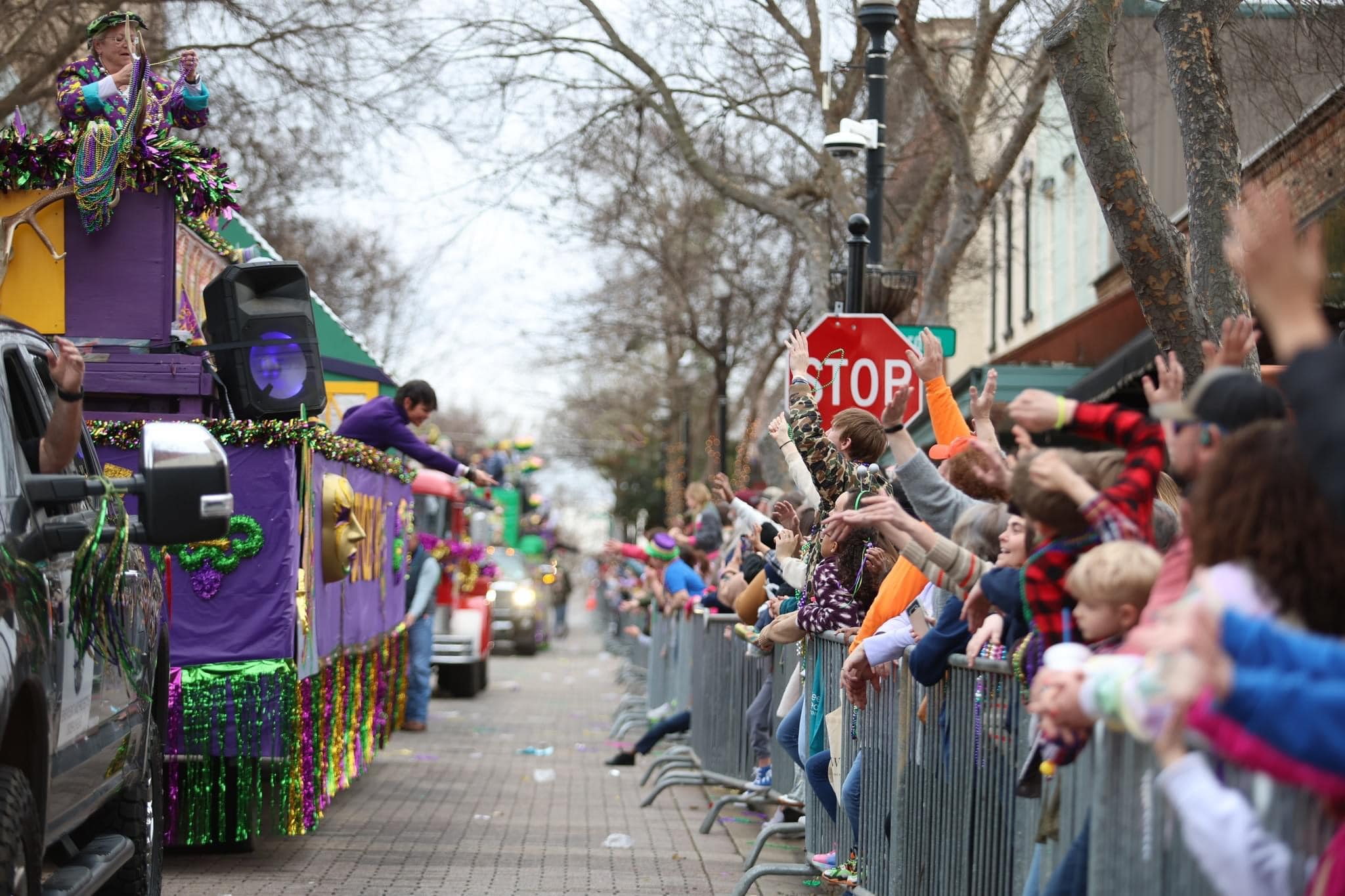

Vicksburg’s unique historical and cultural significance makes it a natural location for vibrant celebrations like Mardi Gras. In the picturesque river town, festivities kick off with the River Revelers Masked Ball, where guests enjoy cocktails, dinner, and dancing. Attendees are encouraged to wear black-tie attire for a night of mystery and elegance. The evening culminates in the crowning of the queen and king of the River Revelers, the newly crowned royals who go on to reign over the Vicksburg Downtown Mardi Gras Parade.
Carnival’s allure even captivated Rankin County, where in Brandon, the Krewe de Roux Festival has exploded into a local favorite. Held over two days, the festival features a lively parade on the first evening, organized by the Rankin County Chamber and the City of Brandon, and is followed by a band amid myriad downtown restaurants that keep their doors open late into the night. On the second day, the party continues with a gumbo cook-off. The family-friendly event also includes a classic car show and activities for revelers of all ages.
No matter where in Mississippi you choose to celebrate Mardi Gras, it’s “a special kind of magic,” as Thomas concludes. “Nobody’s a stranger, calories don’t matter, and no costume is too ridiculous. You’re likely to lose track of time and days altogether, but you’re living life, and so is everyone around you. It’s a shared spirit, truly contagious, that will stick with you the rest of the year.”
******
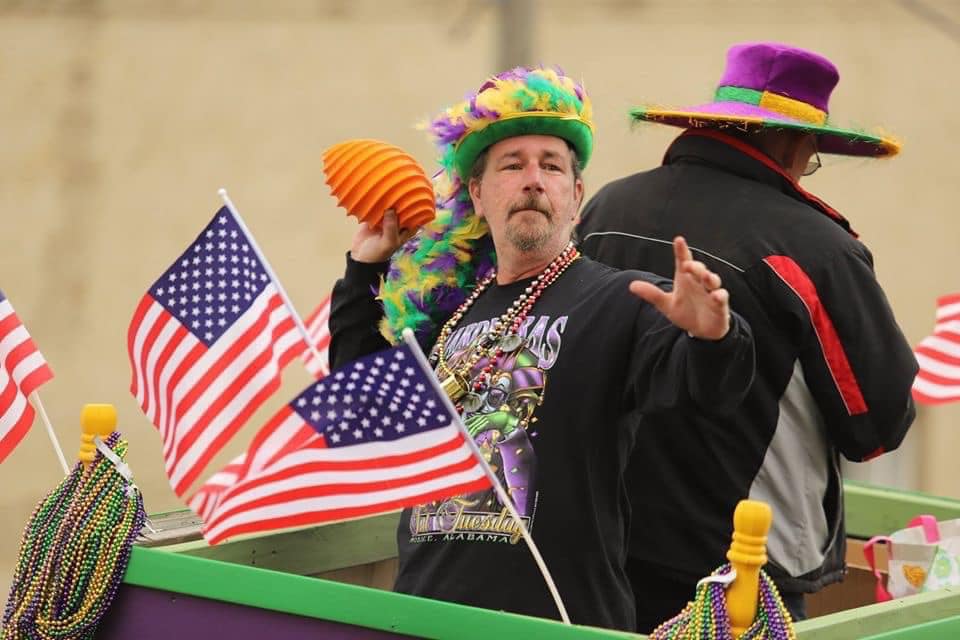

Abreeza Thomas’s Tips for Attending Mardi Gras in Mississippi
Before the Parade:
Check the Parade Route & Parking-Make sure you review the parade route and find out where parking is available. As the season approaches, many cities will post this information on their Facebook pages or local news outlets, including street closures.
Allow Extra Travel Time-Be sure to account for possible traffic delays. While it’s not usually terrible, traffic can still get backed up, so allow some extra time to avoid rushing.
Prepare for Weather Variations-Mississippi’s weather can be unpredictable during Carnival season. Temperatures fluctuate, so dress in layers and check the forecast before heading out.
During the Parade
Attend Both Day and Night Parades-Try to experience both a daytime and nighttime parade. The nighttime atmosphere can be especially magical, offering a different vibe than daytime parades.
Wear Comfortable Shoes—You’re likely to do a bit of walking and be on your feet for most of the parade, so wear shoes that ensure a parade without discomfort.
Stay Hydrated and Pack Snacks-Remember to drink plenty of water, wear sunscreen, and pack snacks. You’ll likely be outdoors for an extended period; good food and drinks fuel a great parade experience.
Wear Festive Attire-Mardi Gras is all about fun! Don’t be afraid to wear a costume, face glitter, or the traditional purple, green, and gold colors. Embrace the festive spirit without worrying about what others think.
General Advice
Arrive Early- The earlier you arrive, the better parking and parade spot you’ll get. Streets typically begin closing an hour before the parade starts, and crowds tend to form early, especially for popular parades.
Look for Krewes with Balls to Attend- If you’re lucky, you can catch a local krewe ball during your visit, adding to the Carnival experience.

